Philosophical Sovereignty: The Foundation State Independence
Russia’s destiny depends on the rebirth of its own sacred way of thinking.
Alexander Dugin, in this in-depth interview, explains why true state sovereignty begins with philosophical independence, arguing that Russia can only exist as a genuine civilization once it cultivates its own sovereign philosophy rooted in Orthodox tradition.
In recent years, the term “independence” has increasingly appeared in public discourse — for example, economic independence or technological independence. Does the concept of philosophical independence or sovereignty exist? And does Russia possess such sovereignty?
Every civilization, without exception, possesses a kind of sovereignty — intellectual, philosophical, even theological. A civilization is something greater than a country. A particular state may lack philosophical sovereignty, yet a civilization must have it.
Today, we are increasingly convinced that Russia is not merely a state, but a state-civilization — the Russian world has its own essence and autonomy, a center within itself, and does not serve as an appendage to something else. We are not a continuation of Western European civilization. Therefore, the question of philosophical sovereignty now takes precedence.
Hegel once said that no state can be great without a great philosophy — and this is fundamentally true. For example, the creation of the German Empire in the 19th century under Bismarck and the Hohenzollerns was preceded by the work of Fichte and Hegel, who forged a great philosophy for a great nation. Such a sequence is not mandatory, but at some point a great state and its sovereign philosophy must converge.
Now has come the time when Russia vitally needs its own sovereign philosophy. This is not a matter of choice. It is an imperative. One cannot rely solely on technological, political, or economic sovereignty. True civilizational sovereignty is, above all, philosophical, intellectual, and spiritual sovereignty.
We have almost forgotten such words as spirit, philosophy, and theology, treating them as something irrelevant. Yet these are the fundamental paradigms, the key codes of any civilization. Thus, sovereign philosophy is the affirmation of our civilizational code. And only philosophers can uncover, describe, justify, and ultimately create this sovereign code.
For this reason, the question of sovereign philosophy now stands in stark relief. Russia cannot be sovereign as a state-civilization if it does not have its own independent philosophy.
So, as I understand you, we do not yet have a sovereign philosophy?
To say that it does not exist at all would be to deny ourselves, for philosophy cannot be artificially created — it is a living tradition. We do have a sovereign philosophy, but it remains dormant and unactivated. It rests on principles already present within our society — above all, Orthodox culture and fidelity to the Orthodox faith. There can be no Russian sovereign philosophy that is not Orthodox at its core.
For several centuries, Russia has been under the determining influence of Western philosophical thought. Therefore, the affirmation of our civilizational uniqueness — as in the case of the Slavophiles, the Eurasianists, and other intellectual schools — requires a new justification, a rebirth of our independent Orthodox mode of thinking. We must restore the fullness and richness of Orthodox thought that forms our foundation. We cannot replace it with a surrogate or remain within the trajectory of Western European civilization, which has reached monstrous extremes and has now become openly hostile to us. Hence, we must affirm our distinctness — not as something invented from scratch, but as something rooted in continuity with our civilizational path and history.
For this, we must turn to the sources — to Greek and Byzantine Orthodoxy, to the treasury of Orthodox thought from Justin the Philosopher and the Cappadocian Fathers, to the Alexandrian School, John of Damascus, Symeon the New Theologian, and Gregory Palamas. All of this is the treasury of authentic Christian thought, which must not merely be studied, but reactivated: we must grasp its structure and treat it as an operating system or code underlying our historical self-consciousness.
At the beginning of the 20th century, we suffered an intellectual catastrophe: an entire millennium of philosophical history was erased and replaced with the surrogate of Marxist thought. Perhaps Marxism contained some valuable elements that indirectly reflected aspects of our identity. But it is impossible to speak of sovereignty based on a doctrine formed in entirely different conditions — one that embraced the universalism of Western civilization, in which we were relegated to the periphery. During the Soviet period, we possessed political and ideological sovereignty, yet not philosophical sovereignty.
Then, in the 1990s, we lost all forms of sovereignty altogether, which had a tragic impact on Russian philosophical thought. If we combine a century of Communist ideology with the liberal decline and crisis of the 1990s, it becomes clear how far we have drifted from the condition that Russian philosophy had begun to reach in the 19th century — and how we still remain trapped in this philosophical pause. Attempts have been made — during the Soviet era, among émigrés, and in recent decades — but the rupture persists.
Today, the movement toward sovereign philosophy faces resistance from the institutes and university departments of philosophy, which fail to meet the challenges of our time. They continue an inertial process that leads us away from the essential task — the construction of sovereign philosophy. And without it, we will have no independence — technological, economic, or political. The preconditions for its creation exist, and the need is urgent. Yet the existing institutions are utterly unfit for the task.
Of course, one might ask: can philosophy even be institutionalized? It is said, “When philosophers appear, philosophy will appear as well. When they do not, no officials can replace them.”
Can a philosopher be trained within society, as one trains a physicist or a mathematician?
Plato believed that it is possible, and that the responsibility for cultivating philosophers lies with the state. The state must raise them to the heights of contemplation. Since the state grants the philosopher this opportunity, the philosopher is obliged to return and offer society the best laws and ideas. If the philosopher embarks on a metaphysical journey on his own, he might never return — why would he return to the mire of mundane and technical burdens? But if he is sent by the state, it becomes his duty to return with the knowledge he has gained.
Aristotle shared this view: a philosopher can and should be formed deliberately. Yet the state, in cultivating a philosopher, cannot predetermine the content of the truths he will discover. Here lies the risk: the philosopher, educated by the state, might return and declare, “Everything here is wrong.”
So the philosopher’s relationship to the state can radically change?
Consider Socrates. He ascended to truth, returned to share it with society, and was killed by a society unprepared for that truth. A true philosopher, revealing to society the truth about itself, always bears something of Christ — the martyr and the sacrifice.
Therefore, the philosopher cannot serve the state. He serves humanity and truth. Yet the state urgently needs such servants of truth, just as the Church needs martyrs and saints. But the state must dare to raise philosophers knowing it cannot control their minds. On the contrary, the philosopher who returns from contemplation will himself judge what in the state is good and what is bad — at the highest level. He will not overthrow power, but play a role akin to Merlin at the side of King Arthur or a patriarch beside an emperor. The philosophical sphere is a unique domain within the political system — it does not claim power, but it claims truth.
If power wishes to govern according to truth, it must listen to the philosopher. If its aims are confined to force or self-interest, it has no need for him. Yet if the state aspires to be a state-civilization, philosophers must occupy a high and special place within it. This always carries risk, for a true philosopher cannot be controlled. A controlled philosopher ceases to be one — he becomes a propagandist or ideologue. The philosopher is not the one who proclaims what pleases the prince; rather, it is the prince who formulates his decrees in accordance with certain philosophical visions. Hence, cultivating a philosopher is a dangerous enterprise.
Our philosophical institutions over the past hundred years have merely served power and the dominant ideology — first Soviet, then liberal. Today, neither ideology remains, and these institutions persist by inertia. And precisely now, as the urgent need for civilizational philosophical sovereignty emerges before our eyes, profound reform of these institutions is required. We must build pathways that enable chosen individuals among our people to ascend toward contemplation. This can and must be ensured.
For now, however, our institutions remain captive to the inertia of alien ideology and mundane concerns. Institutionally, we are nowhere near the creation of a sovereign philosophy. Perhaps everything depends on the appearance of at least one true philosopher. Together with the state, such a person could create an authentic philosophical institution and establish education capable of recognizing those with a calling, helping them to unfold, and preparing them for this path.
Philosophers cannot be trained like technical specialists. Yet we can create the conditions — intellectual oases in the form of institutes, departments, even philosophical circles.
If certain conditions are required for the birth of a philosopher, then what is the role of scientific institutions that claim to engage with philosophy?
For philosophy to exist, there must be at least one genuine philosopher. If there are two — splendid. Three — even better. Around authentic philosophy, this most delicate substance, institutions can then be built. Pupils, followers, even opponents will emerge. Take Aristotle, for example: he continued Plato’s line while building his own model. This applies only to true philosophers — such as Plato. Even in rejecting him, one still produces something meaningful and rational.
If, however, we speak of bureaucrats in philosophy, it makes no difference whether you accept or reject their ideas — there is simply nothing there to develop or refute. Thus, the initial yeast — the birth of a philosopher — is the essential condition. When such a person appears, the state, if it truly wishes to affirm its sovereignty, must help create around him an atmosphere conducive to the emergence of a school. Only then will an institution led by a philosopher become a genuine school of philosophy.
For in a philosopher lives the image of what he wishes to see in others. He can discern: this one is a philosopher, that one is a bureaucrat. Yet there is a place for bureaucrats too — they may prepare auxiliary materials or study the technical aspects of a given philosophical school. Thus, even those who find themselves in philosophy without being philosophers can have a function within the broader process. A true philosopher will reorganize everything so that each finds his proper place. But if a simulacrum stands at the head, everything will work in vain. Institutions will transmit nothing to society, and living philosophy will be replaced by its imitation — which, sadly, is what we see today.
So the philosopher must necessarily be a living person, a contemporary? Are existing institutions and scholars incapable of achieving philosophical sovereignty based solely on inherited works?
Exactly. Philosophy is always a concrete experience — what Aristotle called the experience of Sophia. Aristotle described it precisely, distinguishing between phronesis and Sophia.
Phronesis is the accumulation of knowledge and data — anyone with aptitude can do this. We have people who engage in phronesis: they study various philosophical schools, understand something about religion, modern philosophy, or postmodernism. Phronesis consists of skills, knowledge, and competencies in grasping or interpreting philosophical codes. It is a profession.
But Aristotle also speaks of Sophia — an entirely different axis. True philosophy begins when the flash of Sophia occurs — and only a living philosopher can testify to it. Such a person dwells among the structures of Sophia and does not converse with his immediate environment: he speaks with Plato and Nietzsche, debates Heidegger, argues with Hegel. For a true philosopher, these other philosophers are his contemporaries.
Only a living philosopher can properly organize phronesis and establish institutions that truly fulfill their purpose. Only he can perceive in another the sparks of Sophia — those who carry the seed — rather than those who merely excelled on examinations.
Nothing can change without such a philosopher. Phronesis cannot replace Sophia. Sophia is a gift, a divine spark that makes a philosopher what he is.
You speak of the philosopher as something sacred…
Indeed.
Then is he a scholar or not?
No. A philosopher is something greater than a scholar. Scholars are those who, nourished by the light emanating from true philosophy, apply that light to particular fields of knowledge. A scholar becomes such through study and mastery of knowledge. But that alone will never make one a philosopher. The act of Sophia is exceedingly rare.
Science is the offspring of philosophy: at the root of every discipline, whether exact or humanitarian, lies some philosophical model. There is no science without philosophy — though philosophy can exist without science. Philosophy is primary in every sense; it represents the transcendent dimension of thought.
The philosopher seeks truth itself — nothing more. Scholars, in turn, seek to apply that truth in specific realms: mathematics, physics, chemistry, biology, society, politics. Yet to have something to apply, one must first have the source — and that source exists only in philosophy. According to Plato, the human calling is to become a philosopher. But this gift is given to few. In principle, everyone should strive toward the pursuit of truth, though in practice only a few ever succeed.
One cannot artificially create a philosopher, yet he is essential for philosophical sovereignty. What might prompt the state to realize that philosophy is necessary and create conditions for his emergence?
Perhaps when we reach dead ends so intractable that no familiar means can resolve them — then, perhaps, the state will turn to a philosopher. At first, it will summon everyone in sight, producing much confusion and noise. But eventually, amid this heap of false starts, power might by miracle stumble upon something genuine. The paradox is that only another philosopher can discern who truly is a philosopher. It is like in alchemy: to obtain gold, one must already possess gold. Only a philosopher can recognize another philosopher — as distinct from a charlatan who has merely learned to utter clever words.
A philosopher is one for whom truth is more precious than anything. He is willing to bear witness against himself for the sake of truth and renounce all else. Recall Diogenes’ dialogue with Alexander the Great. When asked, “What do you want, philosopher?” he replied: “Do not block my sun.” If, in the eyes of one who claims to be a philosopher, you glimpse self-interest or predation — the desire to become an institute director, for instance — then he is no philosopher.
How, then, can one recognize a philosopher? It is very difficult, but there are indirect signs. Those too comfortable in this world, too well adjusted to its routines, are unlikely to be philosophers. The philosopher feels a pull out of the cave where others dwell content, mistaking shadows and illusions for ultimate truth.
The philosopher must feel a certain unease, a yearning that drives him to resolve the dissatisfaction he feels toward this world. Otherwise, there will be no attraction toward the world of ideas, no philosophical path of ascent, no movement toward the horizons of contemplation.
(Translated from the orignal Russian interview here)


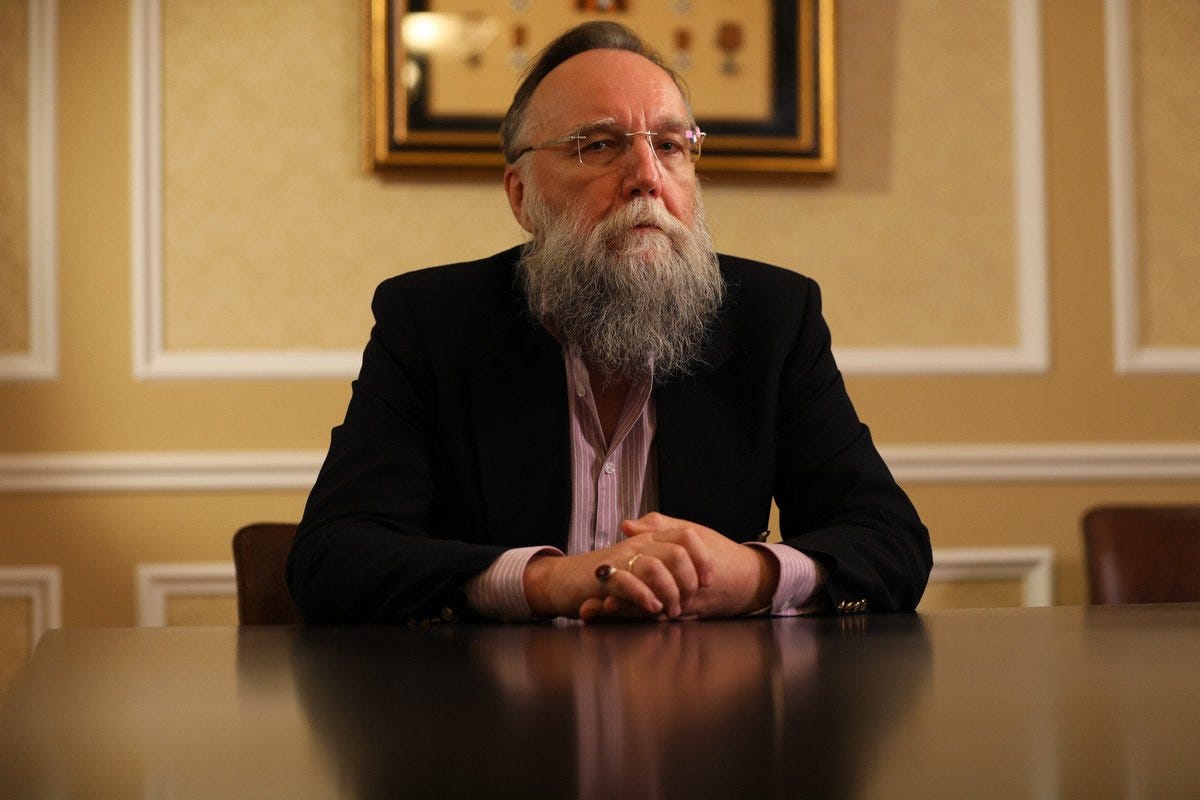
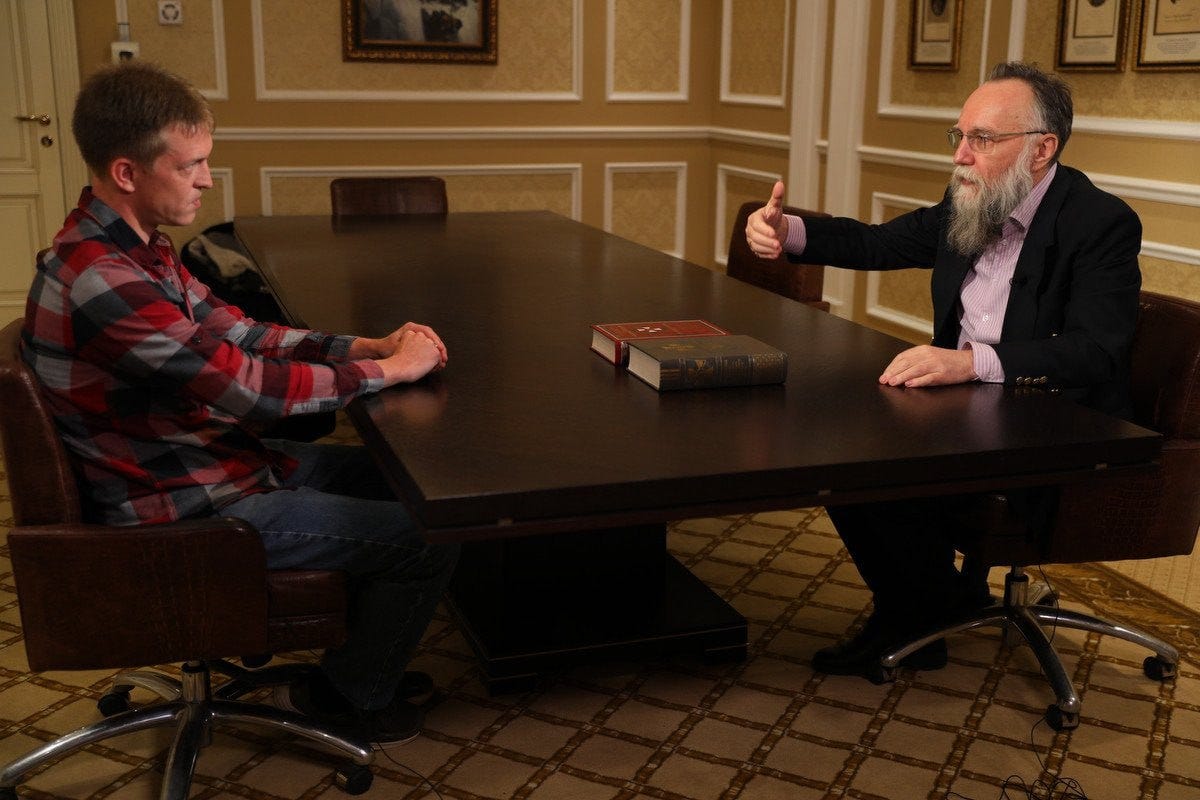
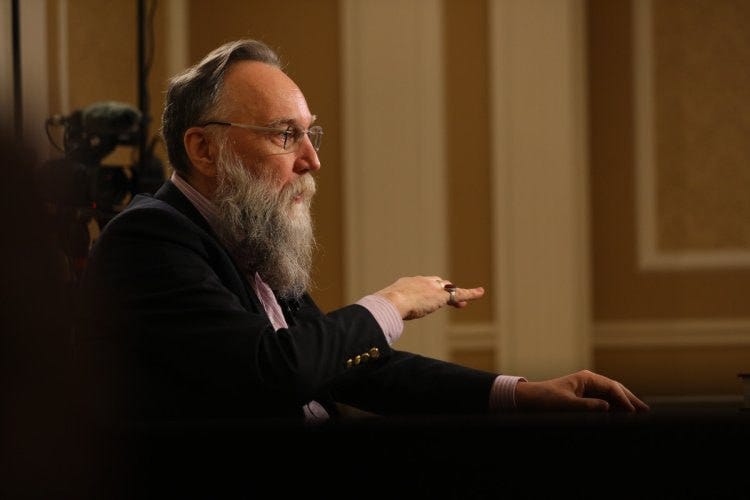
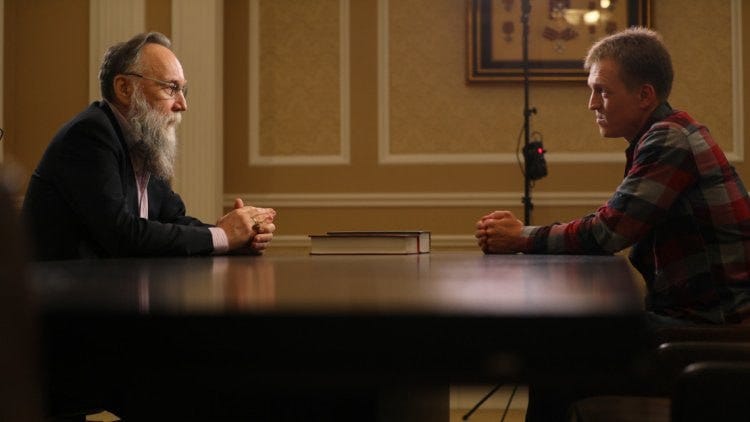
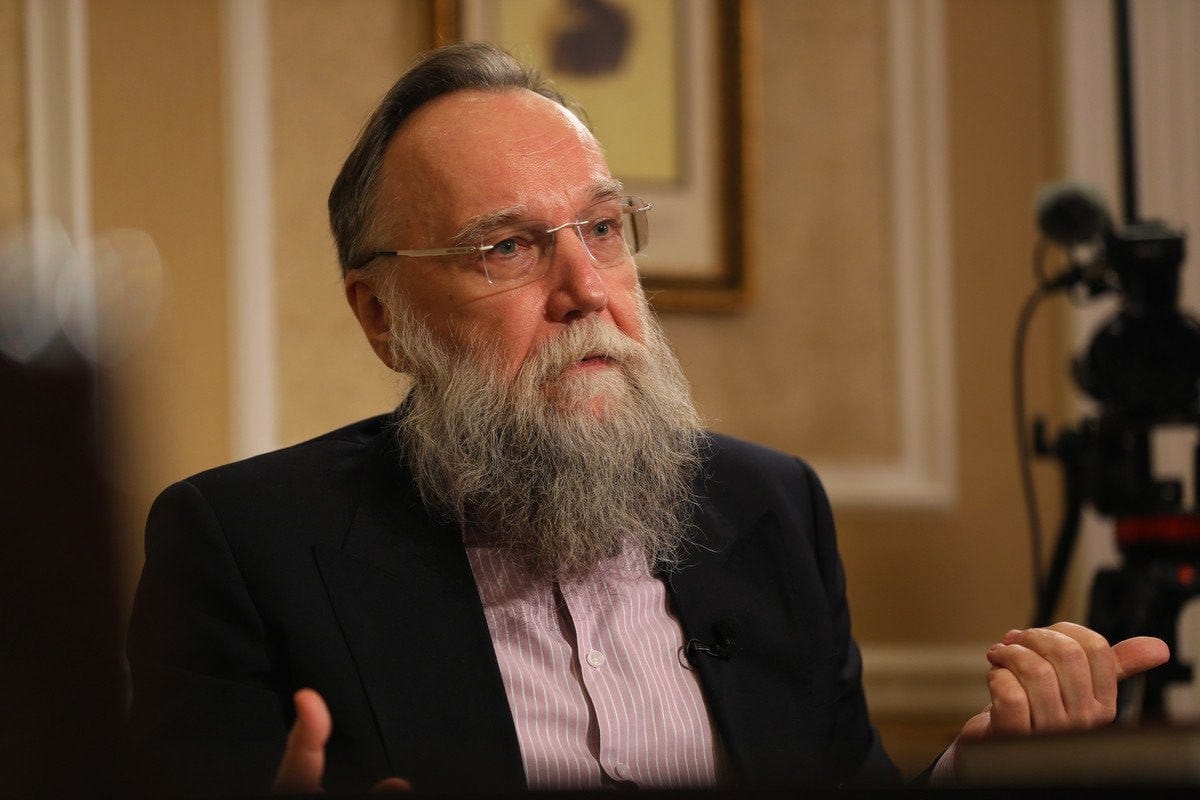

It is astonishing that the Russian intellectuals like Dugin have not noticed that Christianity has failed even absolute monarchs. Russians of all people should know that not only did the Russian Revolutionaries commit regicide, they murdered the entire Russian Royal Family to see that the ugly face of absolute monarchy never raises its ugly head in Russia ever again.
Surely Dugin knows that the only purpose of Christianity was to defend the divine right of kings and hasn't he noticed that it has utterly failed to do so?
Has he not noticed that Christendom ended in 1918?
There will only be national sovereignty when the nation concerned has a moral system strong enough to defend itself against its internal and external enemies, and this will only happen when it decisively removes its anachronism of Christianity after it has removed its anachronism of absolute monarchy.
Ruthcarboni@gmail.com Por favor traducir al español lo que dice Alexander Dugin. Gracias!